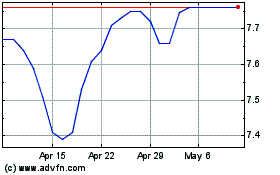Low Carbon Investments Tied To Dimming Fate Of Climate Bill
April 26 2010 - 6:03PM
Dow Jones News
Capitol Hill politics aren't just bogging down a climate bill in
the Senate, but also investment in low-carbon energy.
Portfolio managers, investment firms and businesses are counting
on a carbon-constrained future, under legislation that curbs
greenhouse gases, to grow the demand for green and clean-tech
projects. But after the Senate Majority Leader said last week he's
planning to bring a controversial immigration bill to the floor
before climate bill. One of its key authors--and a rare Republican
backer of climate legislation--nixed plans to unveil a proposal
Monday.
"Unless their plan substantially changes this weekend, I will be
unable to move forward on energy independence legislation at this
time," said South Carolina Republican Lindsey Graham in a
letter.
Nearly every sector of the energy industry is in some way
affected by the climate bill's fate, whether its wind turbines and
solar plants, nuclear power or companies that make natural gas
generators and clean coal technology. While some want to see a
carbon market that will create demand for their products, others
just want to know the investment parameters and clarity on the new
emission rules.
"The U.S. faces a critical moment that will determine whether we
will be able to unleash billions in energy investments or remain
mired in the economic status quo," the U.S. Climate Action
Partnership said after the meltdown in negotiations over the
weekend. USCAP represents nearly two dozen Fortune-500 companies
that have urged Congress to pass a climate bill, including General
Electric Co. (GE), Duke Energy (DUK), and NRG Energy (NRG).
The American Business for Clean Energy (ABCE), a group
representing 3,000 businesses that support passage of a climate
bill, urged lawmakers to keep pushing it as a legislative priority.
"American businesses, large and small, are urging Congress to act
in order to make the United States a world leader in clean energy
technology, reduce our dependence on foreign energy sources, and
create millions of new jobs," the group said.
Graham and his partners, Sens. John Kerry (D., Mass.) and Joe
Liebermann (I., Conn.) have been crafting the proposal with
industry for months. But he said he fears adding controversial
immigration legislation to an already jammed legislative calendar
would crowd out a climate bill. "I will not allow our hard work to
be rolled out in a manner that has no chance of success," he
said.
That leaves utilities that have worked with the Senate trio to
craft climate legislation, such as Exelon Corp. (EXC) and American
Electric Power Co. (AEP), and FPL Group (FPL), flummoxed.
"We are disappointed by this temporary setback, we remain
hopeful that the issues will be resolved quickly, and that the U.S.
Senate will make passage of an energy and climate bill an urgent
priority," said Exelon spokeswoman Judy Rader.
A senior lobbyist that works for a large utility said the
political intervention is frustrating because, "We thought progress
had been made and we were moving in the right direction."
With businesses fearing their work on the bill will have been in
vain, he said there's "an effort to try to get many people to weigh
in with Graham, and say, 'please go back to the table.'"
The setback--which some say may be fatal for the bill this
year--happens as the White House has been ramping up the rhetoric
about how vital passing the climate bill is to invigorate the U.S.
economy and compete with China. President Barack Obama's top
economic advisor, energy czar and energy secretary have been
hitting the public speaking circuit to whip up support for the
climate bill.
Obama himself will Tuesday travel to a Siemens Corp. wind
turbine facility in Fort Madison, Iowa, Tuesday as part of an
orchestrated effort to tout the economic, environmental and
national security benefits of clean energy investments. The company
expanded the plant, adding over 600 jobs with capital from the
stimulus package and tax credits.
Siemens., a unit of the German parent company Siemens AG (SI,
SIE.XE), is representative of thousands of companies looking to
capitalize on a carbon-constrained economy. It's building a range
of products that would be attractive if there was a cost to
emitting carbon. Besides efficient motors and generators, they're
also developing technology to capture emissions from coal plants,
have a retro-fitting business that installs energy efficient
equipment in buildings, and plan to expand their solar power unit
in the U.S.
-By Ian Talley, Dow Jones Newswires; (202) 862 9285;
ian.talley@dowjones.com;
First Trust New Opportun... (NYSE:FPL)
Historical Stock Chart
From Aug 2024 to Sep 2024

First Trust New Opportun... (NYSE:FPL)
Historical Stock Chart
From Sep 2023 to Sep 2024
